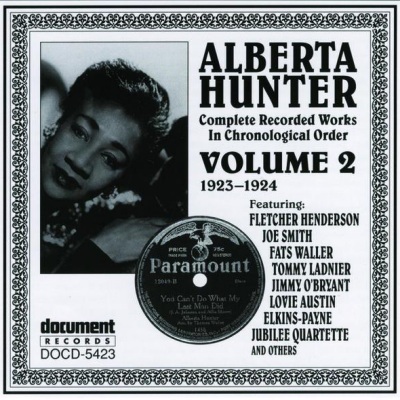
Alberta Hunter Vol.2 (1923-1924)
Volume two in the complete early works of Alberta Hunter as reissued by Document in the 1990s covers the remainder of her Paramount recordings dating from 1923-1924. Her accompanists on these sides included pianist Fletcher Henderson as well as Henderson's Dance Orchestra, consisting of cornetist Elmer Chambers, trombonist George Brashear, clarinetist Don Redman, and banjoist Charlie Dixon. The cornetist paired with Henderson on "Michigan Water Blues" and "Down South Blues" was Joe Smith, a capable accompanist who also made records with Bessie Smith. The pianist on "Stingaree Blues" and "You Can't Do What My Last Man Did" was young Thomas Fats Waller who, like his mentor James P. Johnson, provided a lot of backing for blues singers during the mid-'20s. On Blind Willie McTell's "Experience Blues" and its flipside, the "Sad 'N' Lonely Blues," Hunter is heard with her Paramount Boys, a trio composed of cornetist Tommy Ladnier, clarinetist Jimmy O'Bryant, and pianist Glover Compton. The piano/clarinet duo providing accompaniment on "Miss Anna Brown" and "Maybe Someday" has been identified as Lovie Austin and John Obrigant. The vocal group heard on "Old Fashioned Love" and "If the Rest of the World Don't Want You (Go Back to Your Mother...)" was the Elkins-Payne Jubilee Quartette. This highly rewarding compendium of early Alberta Hunter rarities closes with two Blu-Disc recordings made in November 1924 by a small group of musicians led by a dapper pianist from Washington, D.C. who had just arrived in New York City under the wing of clarinetist and bandleader Wilbur Sweatman. Existing at the very beginning of the extensive Duke Ellington discography, "It's Gonna Be a Cold, Cold Winter" and the rowdy theatrical "Parlor Social de Luxe" feature a vocalist identified as Alberta Prime.
